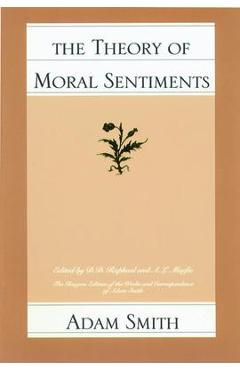The Theory of Moral Sentiments - Adam Smith

Detalii The Theory of Moral Sentiments
libris.ro
94.39 Lei
104.88 Lei
Philosophy
Adam Smith
The Theory of Moral Sentiments - Disponibil la libris.ro
Pe YEO găsești The Theory of Moral Sentiments de la Adam Smith, în categoria Philosophy.
Indiferent de nevoile tale, The Theory of Moral Sentiments - Adam Smith din categoria Philosophy îți poate aduce un echilibru perfect între calitate și preț, cu avantaje practice și moderne.
Preț: 94.39 Lei
Caracteristicile produsului The Theory of Moral Sentiments
Comandă The Theory of Moral Sentiments Online, Simplu și Rapid
Prin intermediul platformei YEO, poți comanda The Theory of Moral Sentiments de la libris.ro rapid și în siguranță. Bucură-te de o experiență de cumpărături online optimizată și descoperă cele mai bune oferte actualizate constant.
Descriere magazin:
The Theory of Moral Sentiments, Smith\'s first and in his own mind most important work, outlines his view of proper conduct and the institutions and sentiments that make men virtuous. Here he develops his doctrine of the impartial spectator, whose hypothetical disinterested judgment we must use to distinguish right from wrong in any given situation. We by nature pursue our self-interest, according to Smith. This makes independence or self-command an instinctive good, and neutral rules as difficult to craft as they are necessary. But society is not held together merely by neutral rules; it is held together by sympathy. Smith argues that we naturally share the emotions and to a certain extent the physical sensations we witness in others. Sharing the sensations of our fellows, we seek to maximize their pleasures and minimize their pains so that we may share in their joys and enjoy their expressions of affection and approval. The Theory of Moral Sentiments, Smith\'s first and in his own mind most important work, outlines his view of proper conduct and the institutions and sentiments that make men virtuous. Here he develops his doctrine of the impartial spectator, whose hypothetical disinterested judgment we must use to distinguish right from wrong in any given situation. We by nature pursue our self-interest, according to Smith. This makes independence or self-command an instinctive good, and neutral rules as difficult to craft as they are necessary. But society is not held together merely by neutral rules; it is held together by sympathy. Smith argues that we naturally share the emotions and to a certain extent the physical sensations we witness in others. Sharing the sensations of our fellows, we seek to maximize their pleasures and minimize their pains so that we may share in their joys and enjoy their expressions of affection and approval. The Theory of Moral Sentiments, Smith\'s first and in his own mind most important work, outlines his view of proper conduct and the institutions and sentiments that make men virtuous. Here he develops his doctrine of the impartial spectator, whose hypothetical disinterested judgment we must use to distinguish right from wrong in any given situation. We by nature pursue our self-interest, according to Smith. This makes independence or self-command an instinctive good, and neutral rules as difficult to craft as they are necessary. But society is not held together merely by neutral rules; it is held together by sy

Produse asemănătoare
Produse marca Adam Smith

Inquiry into the Nature and Causes of the Wealth of Nations
![]() libris.ro
libris.ro
Actualizat in 28/10/2025
72.26 Lei



